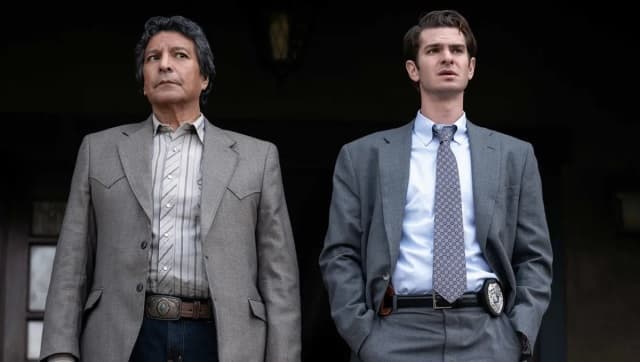Language: English “All of that personal revelation — it seems to me that it’s just men listening to their own selfish desires, and calling it God, so they can justify anything.” With these words, Allen Lafferty (Billy Howle) underlines the guiding thesis of Under the Banner of Heaven, a true-crime series about the atrocities committed in the name of religion. On the evening of 24 July 1984, Allen, the youngest of a prominent Mormon family described as the “Kennedys of Utah,” came home from work to find his 24-year-old wife Brenda (Daisy Edgar-Jones) lying in a pool of blood in the kitchen, and their 15-month-old daughter Erica slain in her crib. The killers were his own brothers, Ron (Sam Worthington) and Dan (Wyatt Russell), who claimed that God had served them a commandment to slit the throats of their sister-in-law and niece. The truth, as evidenced by the series, was the killers believed Brenda had swayed Ron’s wife into leaving him after he had gotten more and more abusive. The truth was the killers believed Brenda had hampered their Godly mission by urging the wives of their Mormon family to not give into fundamentalist notions endorsing polygamy, militant libertarianism and harsher patriarchal authority. The truth was, and still remains, there is no atrocity that “men of God” can’t justify, more so men who believe God speaks directly to them. Slavery, incest, abuse, genocide, you name it — the hubris of religion is such that its more forceful literal-minded advocates can sell the more gullible anything, as if it came with a personal seal of approval from their Almighty Father.
Within a true-crime framework, Under the Banner of Heaven highlights the dangerously thin line between scriptural literalism and messianic delusions.
Adapting the 2003 non-fiction book by Jon Krakauer for the screen, creator Dustin Lance Black layers a police procedural and related machinations on top of its investigation into faith gone rogue. [caption id=“attachment_10753761” align=“alignnone” width=“640”] Andrew Garfield as Detective Jeb Pyre[/caption] Chief among these machinations is the pair-up of the detectives in charge of the investigation. Andrew Garfield plays Detective Jeb Pyre, a God-fearing Mormon with a wife and two daughters. The double murder plus the dementia slowly eating away at his ageing mother’s memories put his faith to gruelling tests with each episode. Jeb’s Native American partner Bill Taba, played by Gil Birmingham, is a more seasoned detective from Las Vegas, who brings an outsider (non-Mormon, non-white, big-city) perspective. The polarity creates a bit of friction before the dynamic smooths over. While Jeb wrestles with his belief and all that he was taught in Sunday school, Bill maintains an unwavering presence, teaching his partner to focus on facts rather than faith, and trust his internal moral compass rather than let scripture guide every decision. In a show where everyone is talking about “Heavenly Father,” “prophets,” “priesthood holders,” and “the one mighty and strong,” his wit and scepticism is a welcome relief. Bill calls himself “a zealot of the Church of caffeine.” Viewers would do well to keep that most consecrated drink at hand if they want to make it through the end. What may have been a two-hour movie in a pre-streaming era is stretched out over seven long episodes that are often dramatically inert. The show’s intrigue, which isn’t rooted in the whodunit as much as the why of it all, weakens as the series sputters along at a funereal pace. In an attempt to illustrate how divine-mandated violence has always been embedded in the teachings of Mormonism (like in just about every religion), episodes give us mini-history lessons about its founder Joseph Smith and his successors. Most of these lessons are recounted by Allen to Jeb. But they are obviously meant to educate the non-Mormon among us. The seeds of fundamentalism are traced to the Christian sect’s repeated violent persecution since the Latter-Day Saint movement in early 19th century. While members of the Church of Jesus Christ of Latter-day Saints (LDS) in Utah adapted to the changing times over the years, extremist factions decentralised to remote pockets around America, where they could practice polygamy, believe in personal revelations from God, and spout the doctrine of “blood atonement.” But these free-associative flashbacks of Mormon history are entwined into the story without a clear sense of intertextuality. The back-and-forth transitions never feel organic. Instead, they only hamstring the suspenseful progression of the main procedural arc. [caption id=“attachment_10753781” align=“alignnone” width=“640”]
 Gil Birmingham (L) as Detective Bill Taba[/caption] The whole Lafferty brood were raised with strong Mormon values, but well short of the fundamentalist ideas that took hold of Ron and Dan as adults. Growing up, a little patriarchal violence was still the order of the day. Allen recalls a childhood memory when their dad Ammon (Christopher Heyerdahl), ever the disciplinarian, once flogged their pet pup to death for not doing their chores to his expectations. There are explicit and implicit suggestions of him beating his wife too. A later scene shows him lashing an adult Dan on the knuckle with a belt in public for refusing to pay property taxes and risk losing the family home. So, when Ron and Dan turned to extremism, they also took their dad’s lessons about violence as a means of control to its extreme conclusion. The anger first stemmed from financial pressures. Both Dan and Ron were dealing with failing businesses and projected their anger at the government for making them pay taxes, believing themselves to be above the laws of men. This compounded with the anger at the government over not letting them practise all their beliefs, like polygamy, when they decided to target Brenda and Erica. Wyatt Russell traces Dan’s descent from quiet rage into pathological delusion more convincingly than Worthington does as Ron. [caption id=“attachment_10753811” align=“alignnone” width=“640”]
Gil Birmingham (L) as Detective Bill Taba[/caption] The whole Lafferty brood were raised with strong Mormon values, but well short of the fundamentalist ideas that took hold of Ron and Dan as adults. Growing up, a little patriarchal violence was still the order of the day. Allen recalls a childhood memory when their dad Ammon (Christopher Heyerdahl), ever the disciplinarian, once flogged their pet pup to death for not doing their chores to his expectations. There are explicit and implicit suggestions of him beating his wife too. A later scene shows him lashing an adult Dan on the knuckle with a belt in public for refusing to pay property taxes and risk losing the family home. So, when Ron and Dan turned to extremism, they also took their dad’s lessons about violence as a means of control to its extreme conclusion. The anger first stemmed from financial pressures. Both Dan and Ron were dealing with failing businesses and projected their anger at the government for making them pay taxes, believing themselves to be above the laws of men. This compounded with the anger at the government over not letting them practise all their beliefs, like polygamy, when they decided to target Brenda and Erica. Wyatt Russell traces Dan’s descent from quiet rage into pathological delusion more convincingly than Worthington does as Ron. [caption id=“attachment_10753811” align=“alignnone” width=“640”] Daisy Edgar-Jones as Brenda Lafferty[/caption] Be it Chloe Pirrie as Dan’s beleaguered wife Matilda or Adelaide Clemens as Jeb’s beleaguered wife Rebecca, the women are a little hard done by, stranded in underwritten roles. In a world where they are conditioned to become obedient wives and mothers, the show demonstrates how faith can be weaponised as a cage — to a point where some experience Stockholm Syndrome. So, not all women are afforded the same degree of autonomy. But at least the victim isn’t treated as a footnote. Daisy Edgar-Jones brings the strong-willed Brenda to some kind of recognisable life. Right from the moment, she is introduced into the Lafferty household at an unpleasant family lunch, you sense a palpable tension that she is going to struggle to fit in. Though Brenda too was brought up in a Mormon household, her bishop father believed in a woman’s right to an education, a career and freedom of thought. Unlike some of the Lafferty women coerced into accepting oppression as the status quo, Brenda had a mind of her own. Of course, she is slowly forced to give up her ambition to become a TV anchor so she can raise a family. When Brenda takes her concerns — about Allen falling for his brothers’ delusions — to the LDS Church’s elders, they ask her to stay in the marriage and launch a campaign to save the Laffertys instead. It won’t be the first instance where they offer advice to a woman at the risk of her own well-being. Throughout the show, there are even moments when the Church counsels its flock to put any troubling questions about Mormon history “on a shelf.” More concerned about the optics than the truth, the priests and the bishops would rather forget the more scandalous aspects of their religion’s history. But fundamentalism cannot be ignored. Every religion, from Christianity to Islam to Hinduism, has their fair share of reactionaries dealing in absolutes. If the crimes in Under the Banner of Heaven tell us anything, it’s that absolutes of anything — power, faith or morality — corrupts absolutely. All seven episodes of Under the Banner of Heaven are now streaming on Disney+ Hotstar.
Daisy Edgar-Jones as Brenda Lafferty[/caption] Be it Chloe Pirrie as Dan’s beleaguered wife Matilda or Adelaide Clemens as Jeb’s beleaguered wife Rebecca, the women are a little hard done by, stranded in underwritten roles. In a world where they are conditioned to become obedient wives and mothers, the show demonstrates how faith can be weaponised as a cage — to a point where some experience Stockholm Syndrome. So, not all women are afforded the same degree of autonomy. But at least the victim isn’t treated as a footnote. Daisy Edgar-Jones brings the strong-willed Brenda to some kind of recognisable life. Right from the moment, she is introduced into the Lafferty household at an unpleasant family lunch, you sense a palpable tension that she is going to struggle to fit in. Though Brenda too was brought up in a Mormon household, her bishop father believed in a woman’s right to an education, a career and freedom of thought. Unlike some of the Lafferty women coerced into accepting oppression as the status quo, Brenda had a mind of her own. Of course, she is slowly forced to give up her ambition to become a TV anchor so she can raise a family. When Brenda takes her concerns — about Allen falling for his brothers’ delusions — to the LDS Church’s elders, they ask her to stay in the marriage and launch a campaign to save the Laffertys instead. It won’t be the first instance where they offer advice to a woman at the risk of her own well-being. Throughout the show, there are even moments when the Church counsels its flock to put any troubling questions about Mormon history “on a shelf.” More concerned about the optics than the truth, the priests and the bishops would rather forget the more scandalous aspects of their religion’s history. But fundamentalism cannot be ignored. Every religion, from Christianity to Islam to Hinduism, has their fair share of reactionaries dealing in absolutes. If the crimes in Under the Banner of Heaven tell us anything, it’s that absolutes of anything — power, faith or morality — corrupts absolutely. All seven episodes of Under the Banner of Heaven are now streaming on Disney+ Hotstar.
Prahlad Srihari is a film and music writer based in Bengaluru. Read all the **_Latest News_** _, _ **_Trending News_** _, _ **_Cricket News_** _, _ **_Bollywood News_** _, _ **_India News_** and **_Entertainment News_** here. Follow us on Facebook_, _ Twitter and Instagram_._


)
)
)
)
)
)
)
)
)



